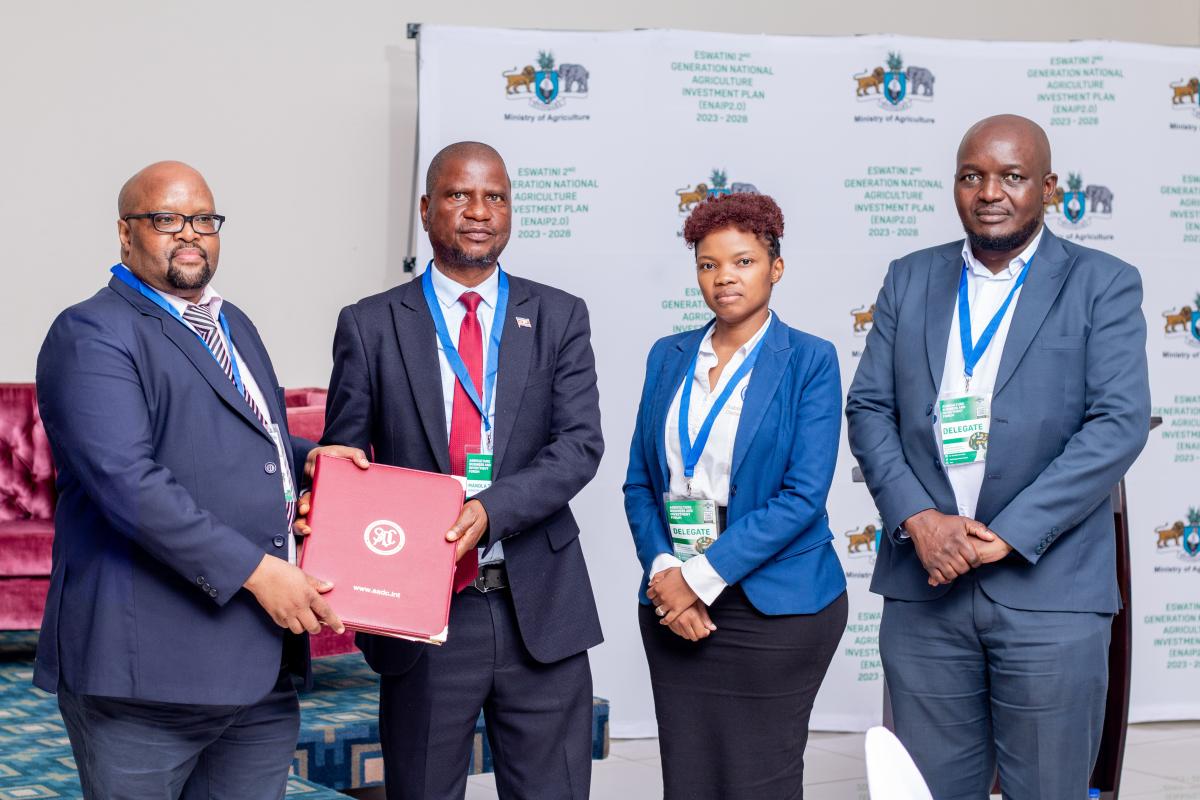CCARDESA Urges Support for SADC Agricultural Development Fund Eswatini Business Indaba
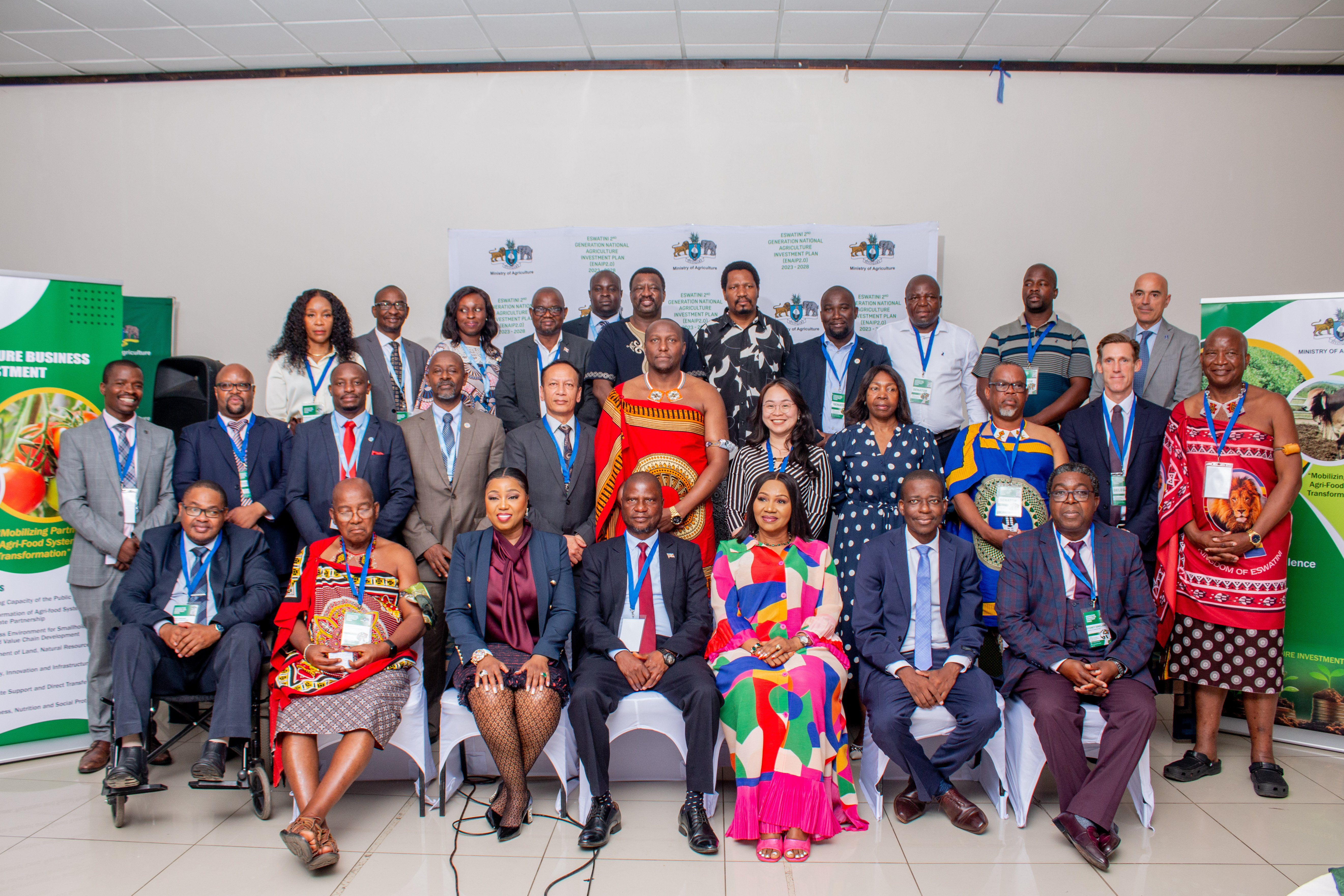
Manzini- Eswatini - CCARDESA attended the National Agricultural Investment Indaba from 18th to 19th September 2024. The Business Forum brought together key stakeholders involved in financing and funding the agricultural sector to increase financial resources and promote active participation in the National Agricultural Investment Platform (NAIP), a public-private investment initiative for the agricultural industry. Specific objectives included raising awareness about key initiatives such as hand-in-hand investment Cases, facilitating high-level discussions on agricultural financing, securing partnerships, and agreeing on terms of reference for the platform. The goal of the Indaba, themed “Mobilizing Agri-Food Sector Partners to Transform Agriculture,” was to boost financial resources and encourage active participation in the National Agricultural Investment Platform—a public-private initiative dedicated to transforming the agricultural industry.
Speaking at the Eswatini Business Indaba, Prof. Dlamini, representing the Southern African Development Community (SADC), outlined an ambitious vision for the region's future by establishing the Agricultural Development Fund (ADF). “I am greatly honored and humbled to stand before you today to briefly discuss a pivotal initiative that holds great promise for the future of our region,” he said. "The Agricultural Development Fund is not just an investment in our crops, livestock, or farms—it is an investment in our people, our future, and the sustainability of our economies.”
Highlighting the crucial role of agriculture in SADC economies, Prof. Dlamini noted that it serves as the backbone of livelihoods for millions, contributing to food security, trade, and development. However, he also addressed the challenges faced by the sector, including limited access to modern technologies, inadequate infrastructure, climate change, and insufficient investment.
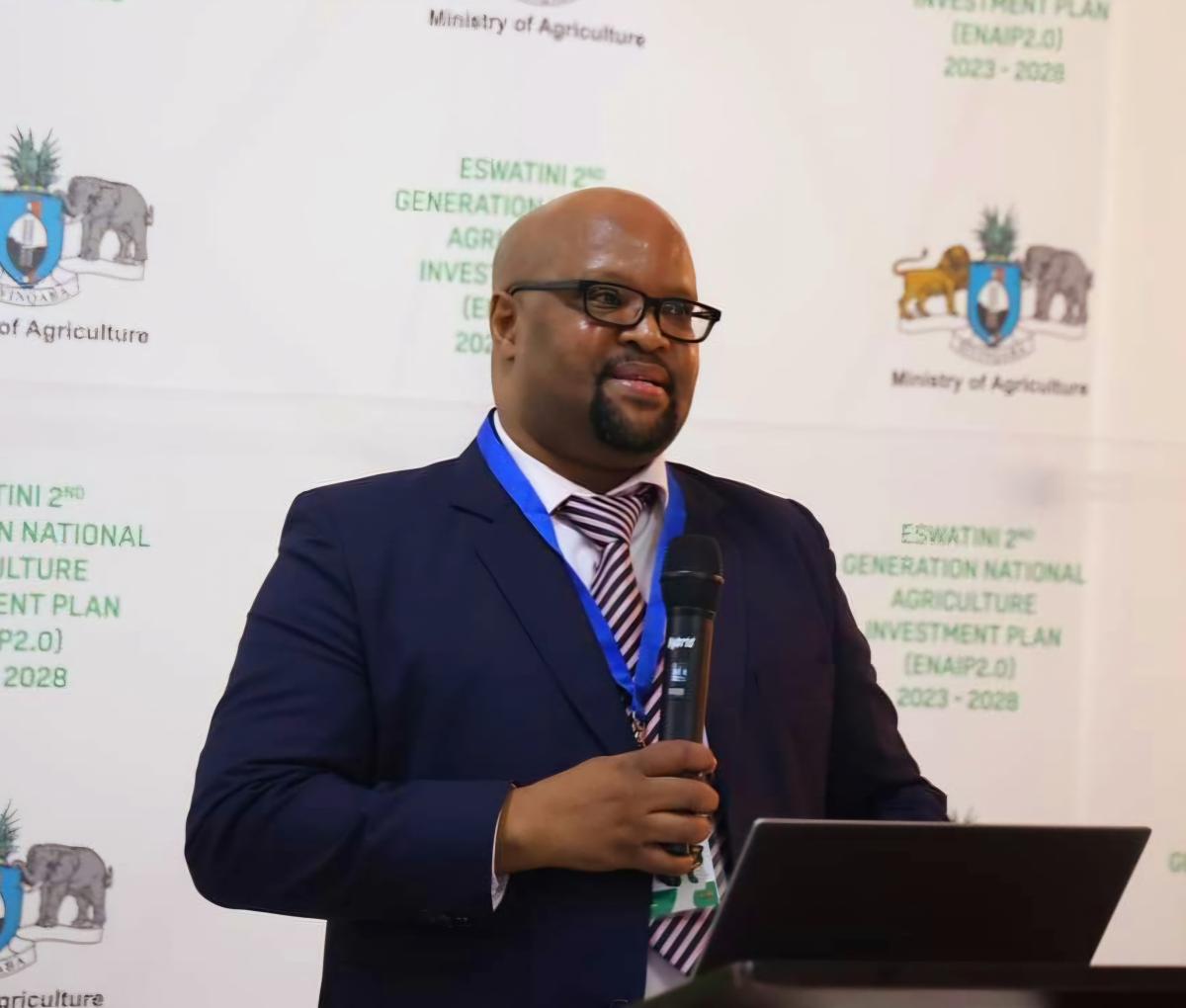
Prof. Cliff Dlamini, CCARDESA Executive Director
“The Agricultural Development Fund is designed to address these challenges by serving as a financial engine for agricultural transformation across the region,” Prof. Dlamini explained. He emphasized the fund's core objectives, including promoting sustainable and inclusive agricultural development, enhancing food security, creating jobs, and stimulating economic growth, particularly in rural areas. “Through this fund, we aim to support smallholder farmers, agribusinesses, and cooperatives, giving them access to credit, grants, and technical assistance.”
Prof. Dlamini outlined key investment areas, such as infrastructure development, research and innovation, capacity building, and climate resilience. “The fund will prioritize investments in rural roads, irrigation systems, storage facilities, and market access,” he said, noting the potential to reduce post-harvest losses and increase profitability. “To ensure our agricultural sector remains competitive, we must invest in modern technologies, climate-smart agriculture, and sustainable farming practices.”
Addressing the growing threat of climate change, Prof. Dlamini stressed the importance of building resilience within agricultural systems. “The fund will support projects promoting sustainable water use, soil management, and crop diversification, ensuring that our agricultural sector can withstand droughts, floods, and other climate-related shocks.”
In addition to national development, Prof. Dlamini highlighted the ADF's potential to promote regional integration. “The Agricultural Development Fund will also serve as a catalyst for regional cooperation. By pooling resources, SADC member states can address common challenges and strengthen regional value chains.”
Before concluding, Prof. Dlamini made a humble request on behalf of SADC. “Eswatini is requested to support the creation of the SADC Agricultural Development Fund and the SADC Regional Development Fund. We further request that Eswatini allow SADC to use its experience as a model to share with other member states.”
Prof. Dlamini also announced that Eswatini would become the first member state to sign the amended charter establishing CCARDESA, approved in May 2024.
Prime Minister Russell Mmiso Dlamini, while addressing the Eswatini Business Indaba, emphasized the critical role of agriculture in the country’s economic transformation, stating, “It is an honour to be part of this prestigious event that seeks to re-invigorate the agriculture sector and turn around the fortunes of emaSwati through farming initiatives and agro-processing.”
He acknowledged the government's ambitious policy for economic revitalization, which aims for a 12% annual growth rate, stressing that agriculture is vital to achieving this goal. “Agriculture remains one of the key sectors in Eswatini’s economy, and their contribution in attaining this goal is significant,” he added.
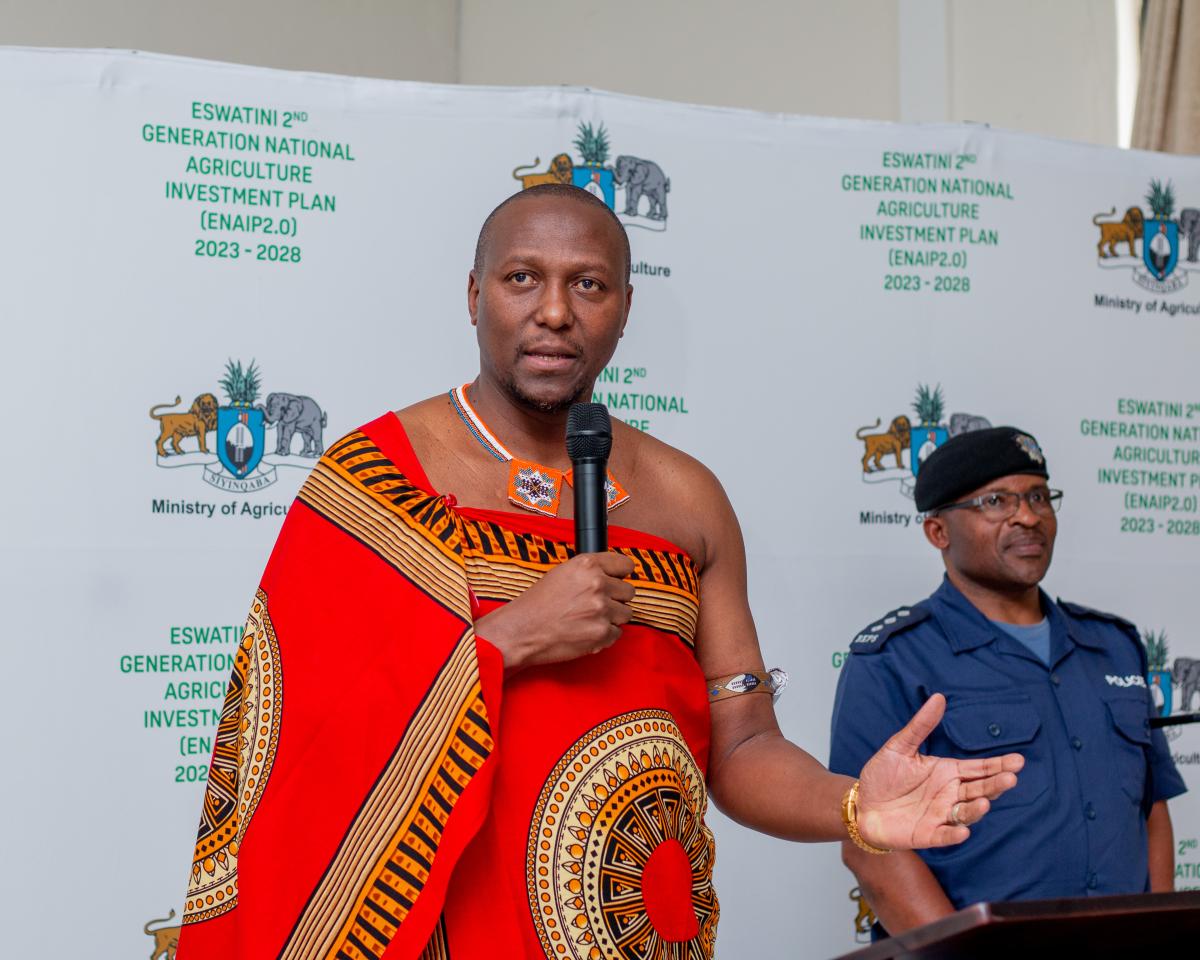
Prime Minister of Eswatini, Russell Mmiso Dlamini
Prime Minister Dlamini also applauded the Ministry of Agriculture for its strategic planning and comprehensive programs, noting, “The programmes to be presented for funding here are a product of meticulous planning, reflecting a clear vision and investment requirements.”
He highlighted the Kingdom’s alignment with international developmental principles, including the UN Sustainable Development Goals and Agenda 2063. “Our national plans are guided by global and regional initiatives, ensuring that local solutions meet the needs of our people,” he remarked.
Dlamini emphasized youth participation, “Inclusivity is key in our plans, and we are making conscious efforts to facilitate youth participation in agriculture, investing in youth-specific initiatives as they are energetic and innovative.”
He underlined the importance of fighting climate change, saying, “Our plans include interventions to build resilience against climate change, and the Mkhondvo-Ngwavuma Water Augmentation Project (MNWAP) is a flagship initiative designed to address drought and water scarcity.”
The Prime Minister concluded by urging stakeholders to engage in the advancement of agricultural development for food sovereignty and commercial export production. “The future of agriculture in Eswatini is bright, but its success depends on the outcomes of this event,” he said, officially declaring the National Agricultural Investment Forum open.
On the sidelines of the Business Indaba, the Honourable Minister of Agriculture of Eswatini officially signed the amendments to the Charter establishing CCARDESA. The CCARDESA Executive Director and a representative from the SADC Legal Unit were on hand to witness this occasion. This marks a significant step forward for agricultural research and development in the region.
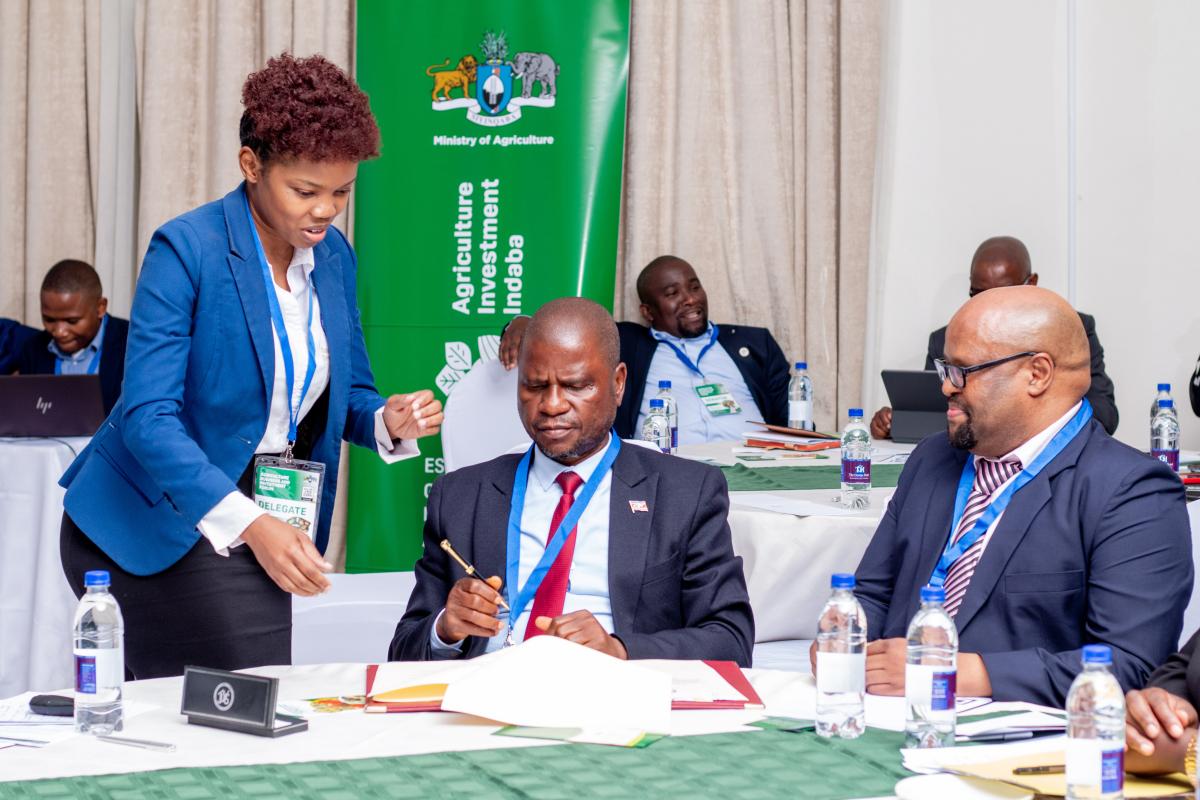
Honorable Mandla Tshawuka, Minister of Agriculture in Eswatini signing CCARDESA Charter
The CCARDESA Finance Manager, Mr Simon Mukuze, accompanied Prof. Dlamini on this critical mission. The event hosted 200 participants, including representatives from financing institutions, the private sector, development organizations, and farmers.
